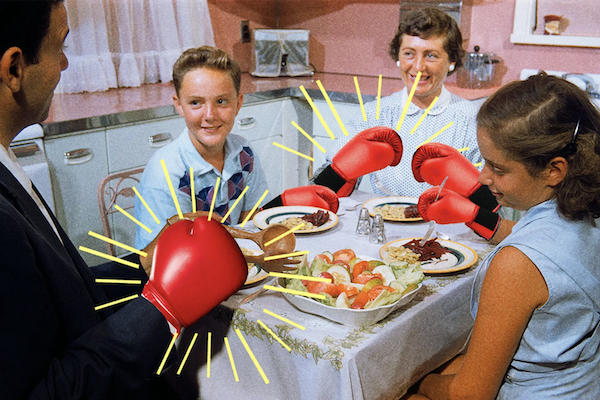Ah, Thanksgiving. A time of shared food, drink and merriment among loved ones––and uncomfortable conversations. We know how it goes. While you’re deflecting the casual ‘when are you going to settle down’ questions and giving desperate glances at the kids’ table you’re no longer invited to, maybe you’ll hear a snarky quip from Aunt Karen about how climate change isn’t happening.
Your natural tendency might be to get up and flee the table, house and neighborhood setting your own 5K PR on the way, but we’d like to offer a few tips on talking climate that might lessen the tension at the table and ensure you save your PRs for your favorite trails.
Because even though it feels uncomfortable, talking about climate change is one of the most important ways we can make a difference on the issue. Roughly 60 percent of Americans say climate change is personally important to them, yet only 33 percent say they actually talk to friends and family about it.
So let’s get chatting. Here’s how to talk climate with your family at Thanksgiving:
1. Get to Know Yourself
Before you can talk climate with someone else, you need to talk climate with yourself. What’s your story? How have you been impacted by the climate crisis? And why do you care? Often times these answers feel so obvious until we have to say them out loud.
So why do YOU care about climate? While it might feel comfy to fall into that dumpster fire, doom and gloom conversation to REALLY show how big this is (we know, you want to save the world! And nice cape, btw) that answer isn’t going to get you very far in a productive conversation. Instead, try taking a more personal approach.
2. Make it Personal
Get to know your personal connection with the climate crisis. Craft your story. Build your foundation. If you’re reading this, there’s a good chance that your love of the outdoors defines who you are. Talk about the impacts you’re already seeing in the outdoor places you love––like shorter ski seasons, wildfires shutting down your favorite trails or droughts keeping you from snagging that monster trout. If you have kids, talk about your fear of them growing up without access to the same outdoor opportunities that you’ve had. Taking the time to understand this personal connection and crafting your own climate story is how you’ll find connection, even with the toughest family member. You’ll find that this will bring people in, rather than push them away
3. Stay Calm and Practice Active Listening
So, now it’s time for the back and forth. We get it, there’s quite possibly nothing more gratifying than throwing that perfect zinger of a response on your Twitter feed––but that’s internet land, and Thanksgiving is a time of real, personal connection––you need to make it count.
Today might not be the day that you change the hearts and minds of your entire family, but it is a day that you can compassionately open the conversation and show you’re willing to have “the talk.” Because when it comes to positions on climate change, people’s opinions are based on their values and beliefs, which is highly tied to emotion.
So, when you start hearing those dreaded phrases like “hoax” or “clean coal,” don’t go straight to the science. Even though the science is pretty much settled on human-caused climate change, leaning too heavily on science and facts in an argument that feels emotional can make you seem cocky and arrogant. And no one walks away feeling good after arguing with an arrogant arse.
Instead, ask questions like:
“How do you feel about climate change?”
“Do you have a climate story you’d be willing to share?”
“What do you think we can do about it?”
Then be prepared to LISTEN. Yes, in this day and age of social media, crafting a response is often at the front of our minds. But active listening isn’t about coming up with a witty response. It’s about, well, actually listening.
4. Know the Science––But Don’t Rely on it Entirely
Research shows that when we’re presented with facts that contradict our strongly held beliefs, we cling more tightly to those beliefs and turn away from logical reasoning and turn instead toward arguments that cannot be scientifically falsified (i.e. emotional arguments).
But it doesn’t hurt to understand the climate crisis and the science that supports it, either. The evidence, causes, effects and scientific consensus are pretty clear and, believe it or not, NASA makes it pretty easy to understand.
If you still need a little help crafting your quick science one-liners, Yale Climate Connections offers some seriously helpful climate comeback strategies for those especially frustrating questions.
5. Keep it Positive + Practice Humor
Obviously the climate crisis is no laughing matter. But sometimes we have to step back and laugh at ourselves. It is the best medicine after all.
Plus, the Thanksgiving dinner table is no place for fatalism. While the U.S. government is currently pursuing a short-sided policy of climate-change denial, countless other world players are trying to make a difference. Electric vehicles are becoming more commonplace, solar power is more affordable than ever and wind energy production is on the rise. With the economics of energy aligning more closely with pro-climate policy, there is lots to be hopeful for on this day of thanks.
Climate change will personally affect everyone at the table. Addressing and combating climate change will be the definitive issue of this generation, and it’s going to take the will of all people, even your intense family, to make change happen.

